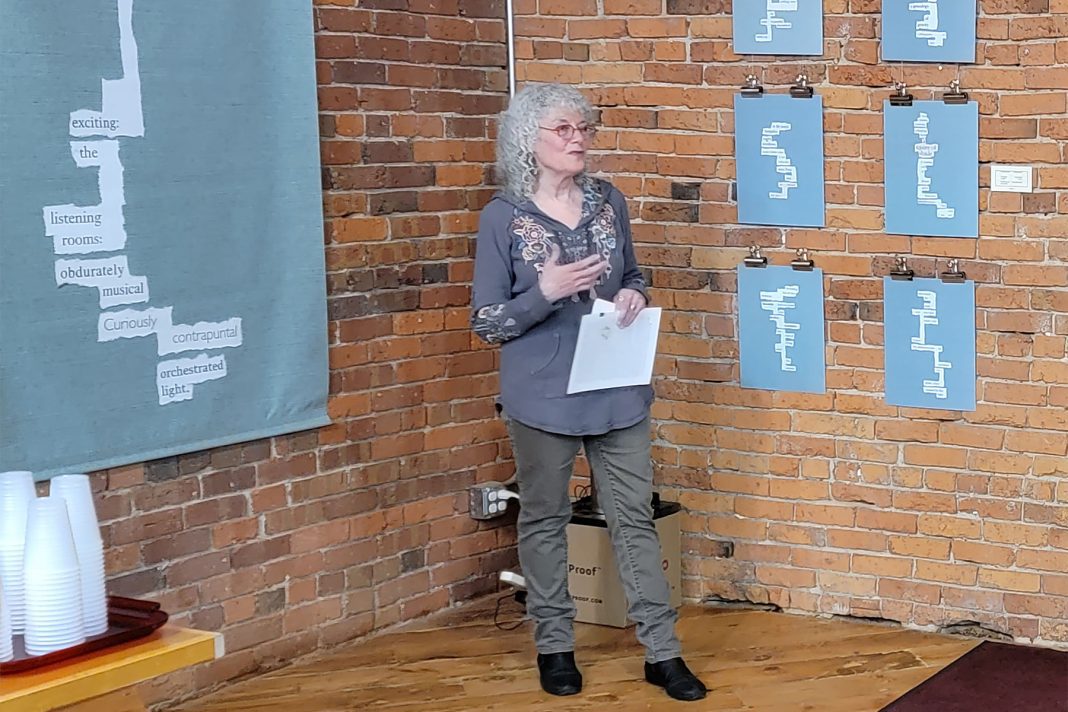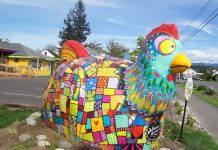The daughter of an artist mother and an engineer/woodcarver father, Judy Kleinberg, 76, has been making art and writing for as long as she can remember.
“I’m always making something,” she says. Though she tried to resist the call to “be an artist,” and started college as a sociology major, the Los Angeles-born poet was quickly drawn back to her roots; by her junior year, she was studying fiber arts. She worked in fiber for many years — always writing, as well — and eventually turned her focus entirely to words.
Luther Allen spent the first 40 years of his life in the Southwest. Now 75, he retired from his building design business last summer. His academic background is in biology and geography — neither poetry nor architecture.
SpeakEasy Poetry Reading Series
Perhaps their common interest in building led them to produce the Bellingham-based SpeakEasy poetry reading series in 2009 and co-edit the anthology “Noisy Water: Poetry from Whatcom County, Washington,” published in 2015.
They started the SpeakEasy poetry reading series with the idea of providing community poets a venue to read their works, along with broadening appreciation of poetry in the local area.
“From an initial audience of about a dozen people, we have grown to regularly hosting 80 to 100 audience members” Luther says.
They think this may be because the programs are theme-oriented, with preselected poems projected on a screen as they’re being read by the contributors which, Luther adds, is a help to hard-of-hearing or visually-oriented listeners.
Early Poems
Luther says he wrote his first poem when he was a junior in high school, when he was supposed to be taking notes in English class.
“It was a terrible poem,” he says, “but I will never forget how the act of writing it made me feel: powerful, affirmed, awakening for the first time to my actual self.”
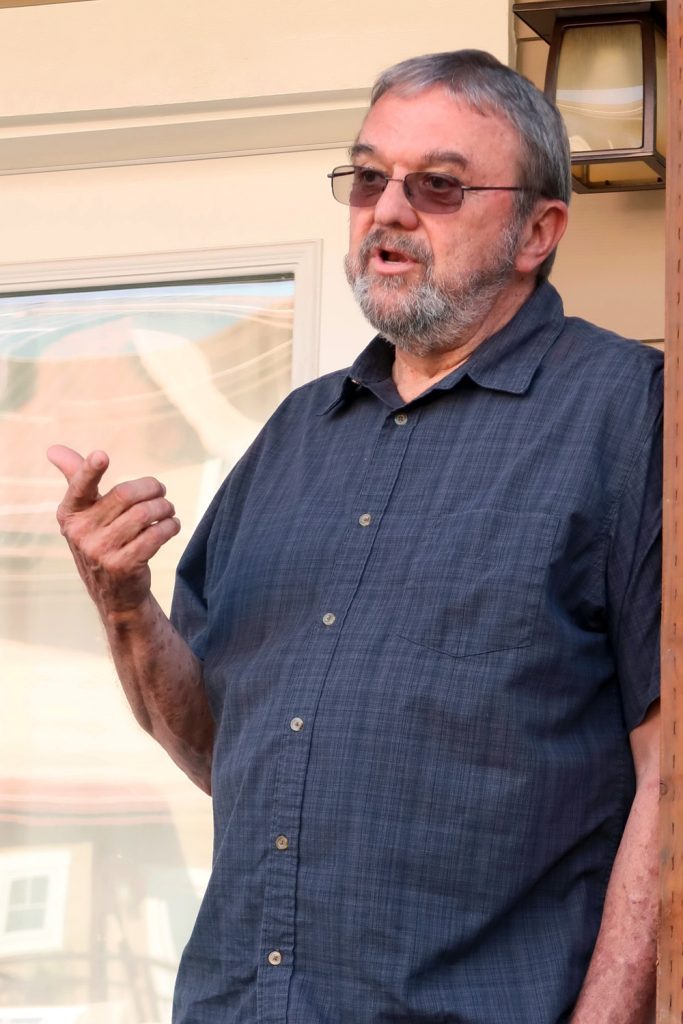
“Using words that came out of the ether to fabricate something that was deeply meaningful, something that in the moment made some sense out of the chaos of the world. It was a sacred act, at least to my inner world” he says.
“And almost 60 years later, I can still have that feeling when immersed in poem-making.”
Luther’s work (and more) can be found on Other Mind Press
Judy says though she wrote poetry as a teenager, it was her first year in college that she “began to see how much poetry could show me about life and language, and loved the way poetry could both expand and condense experience.”

Found Poems and Other Projects
Though she writes “conventional-form” poetry, Judy is perhaps best known for her found poems. These are small collages assembled from text she finds in magazines (most from the free-magazine bin at the Bellingham Public Library).
“I look for places where words come into proximity to create a poetic line with accidental new meaning,” she says.
“That might mean reading across columns or seeing a connection between words in a caption and words in the body of an article. The important thing is that the new syntax is entirely different from its original meaning. I save these bits of text and let them wallow around on my worktable until they start to talk with each other. If I’m lucky, a few of them eventually get together and make a poem.”
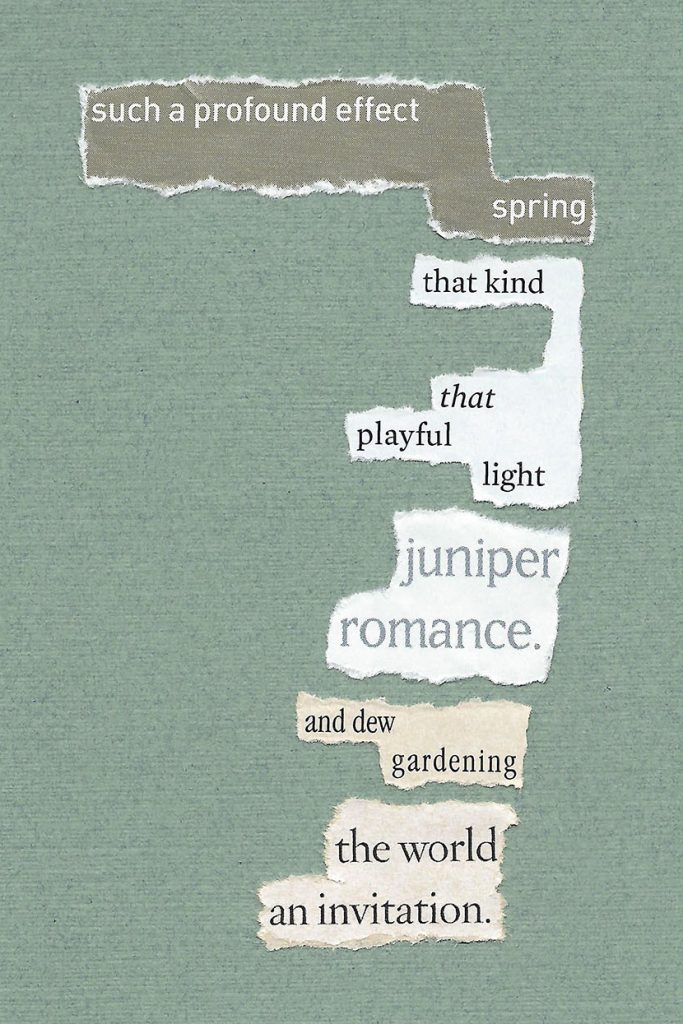
Judy’s primary commitment to regional poetry is The Poetry Department, which she has worked on almost daily since 2010. It includes a 12-month calendar (kudos to the new-kid-on-the-block, Western Washington Poets Network, which has launched an ambitious poetry calendar).
She also runs a personal site, Chocolate is a Verb and has been an annual participant in the Poetry Postcard Fest since 2011 and currently serves on its advisory board.
Poetry Contests For All
For years, the duo have been involved in The Sue C. Boynton Poetry Contest, an annual event that invites Whatcom County poets of all ages and all levels of writing experience (including none!) to write and submit an original poem.
Founded in 2006, the contest is run by people who value community poetry; some of them are poets and former contest winners, others are simply committed to the idea of poetry-for-all, explains Judy.
Luther is a board member of the Whatcom Poetry Series, which sponsors the contest.
Two judges are selected each year to read all the poems and select two categories of winners — Walk Awards and Merit Awards. The winning poems are displayed in front of the Bellingham Public Library and/or on Whatcom Transportation Authority buses, and this year for the first time, two winners will receive monetary awards: the George Drake Award of $100 for the best student poem and the Susan J. Erickson Award of $100 for the best adult poem.
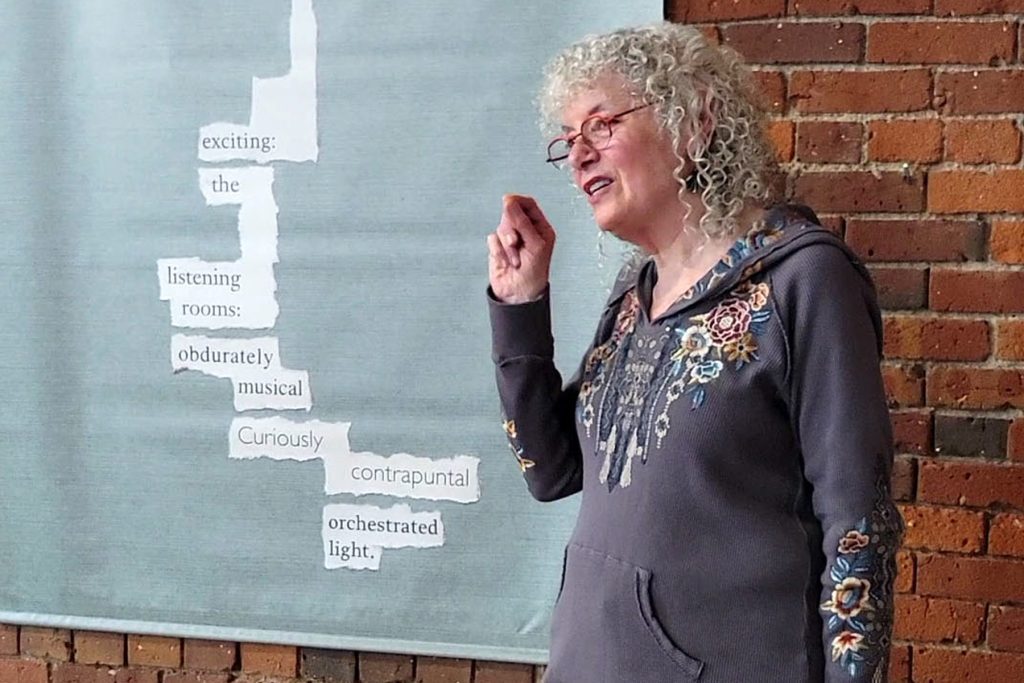
This year’s awards ceremony will take place at 7 p.m. May 23 at Bellingham Cruise Terminal, when the winners are recognized and will read their winning poems. It’s free and open to the public.
Luther says inning poems are often written by someone with no formal training in poetry, whose writing has never been publicly recognized before and who just had something deeply meaningful to say.
“And when that person is an elementary school kid standing up in front of 125 people shakily reading their poem with parents and relatives in the audience,” says Luther, “if that doesn’t bring tears to your eyes nothing will.”
Luther believes poetry is a testament to deeply felt emotions. “When I witness the bravery and courage when “new” poets share their works in an audience of a couple hundred strangers, it gives me hope for the world.”
“Whatever our perspective,” says Judy, “our lives are challenging — physically, socially, environmentally, politically, etc. — and poetry allows us to look at the world through a different lens and shape our responses in a way that is both personal and powerful.”





























